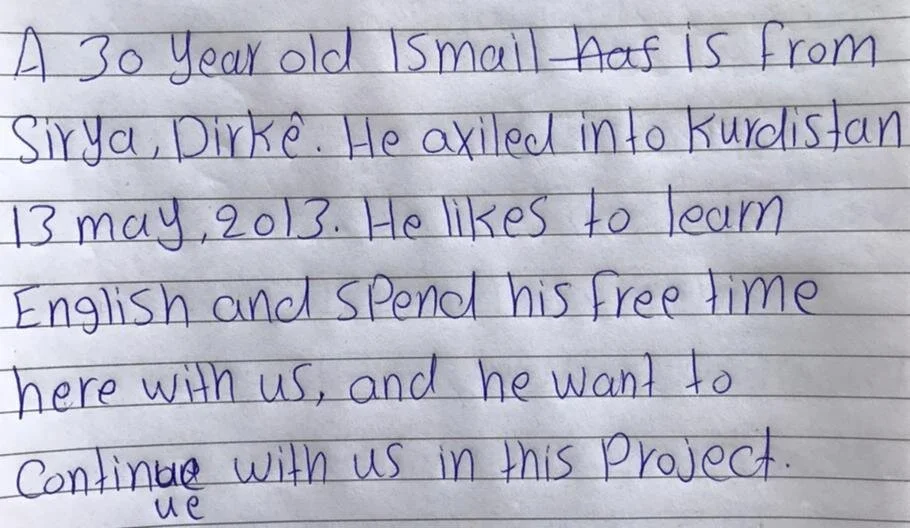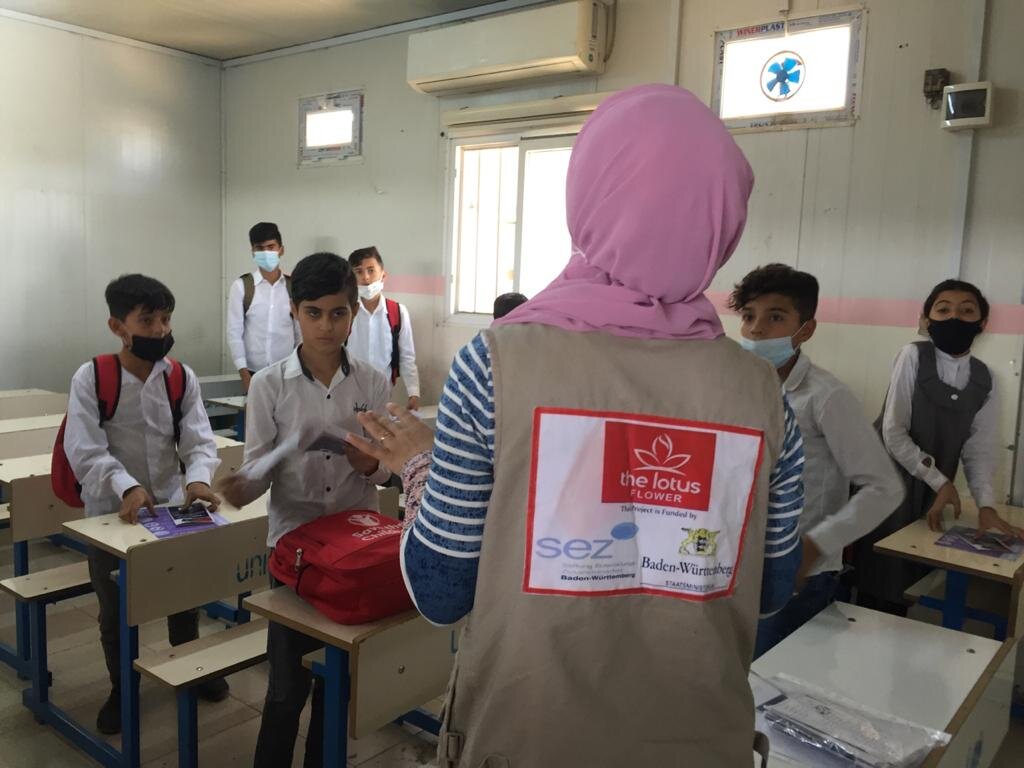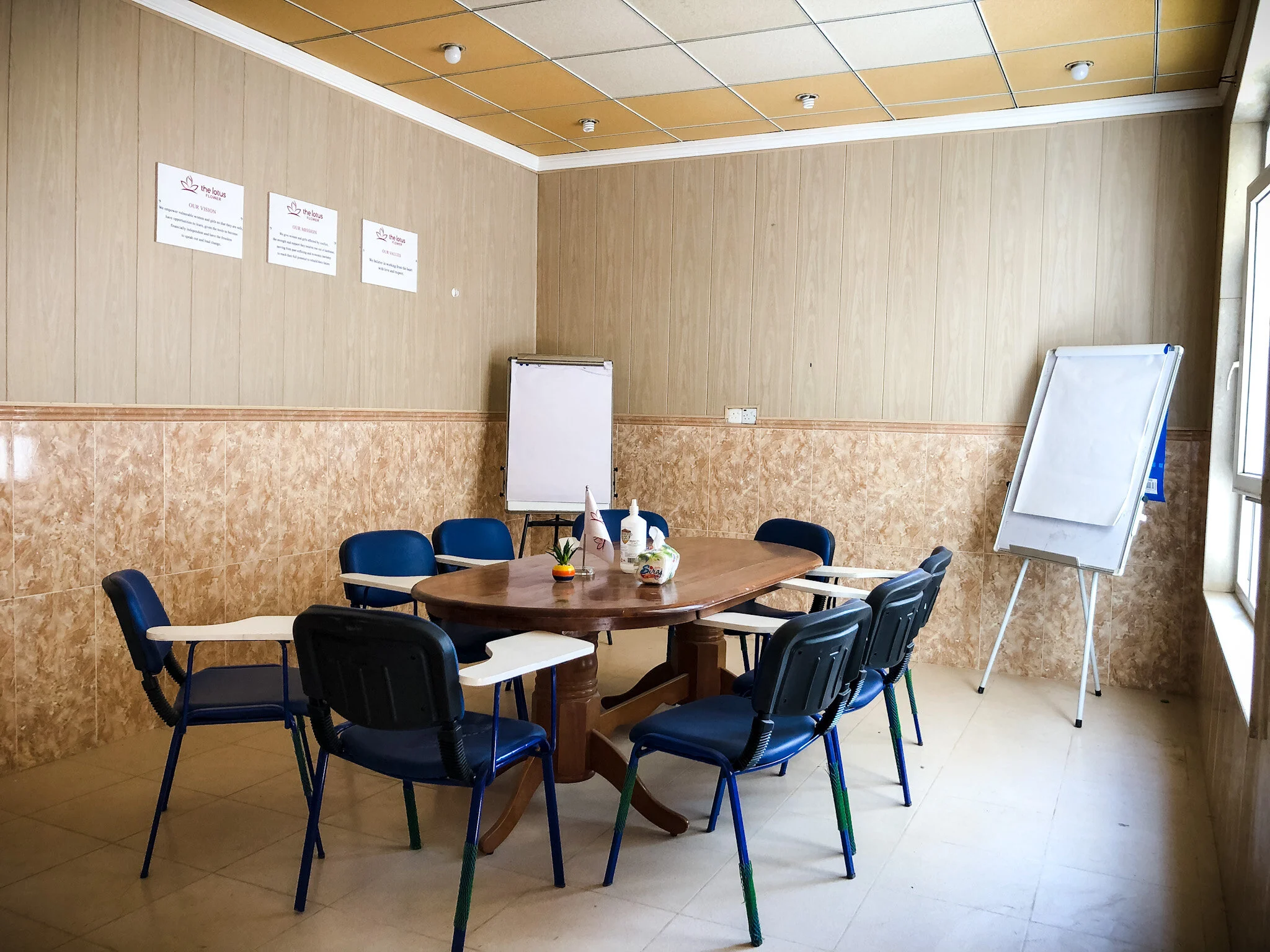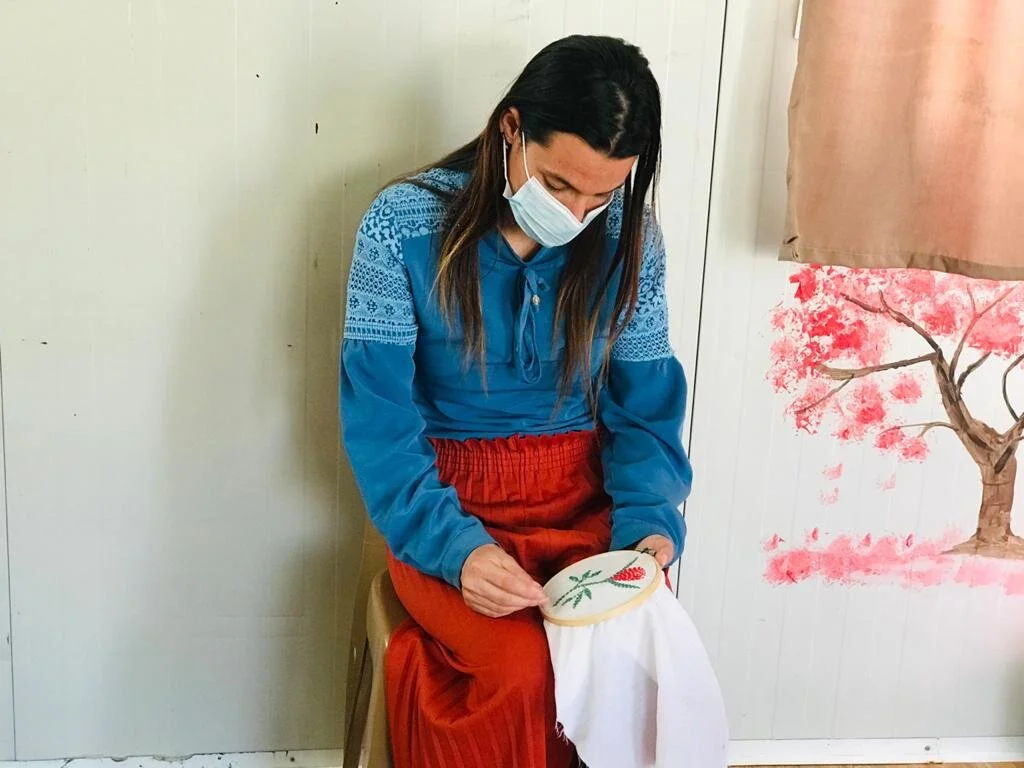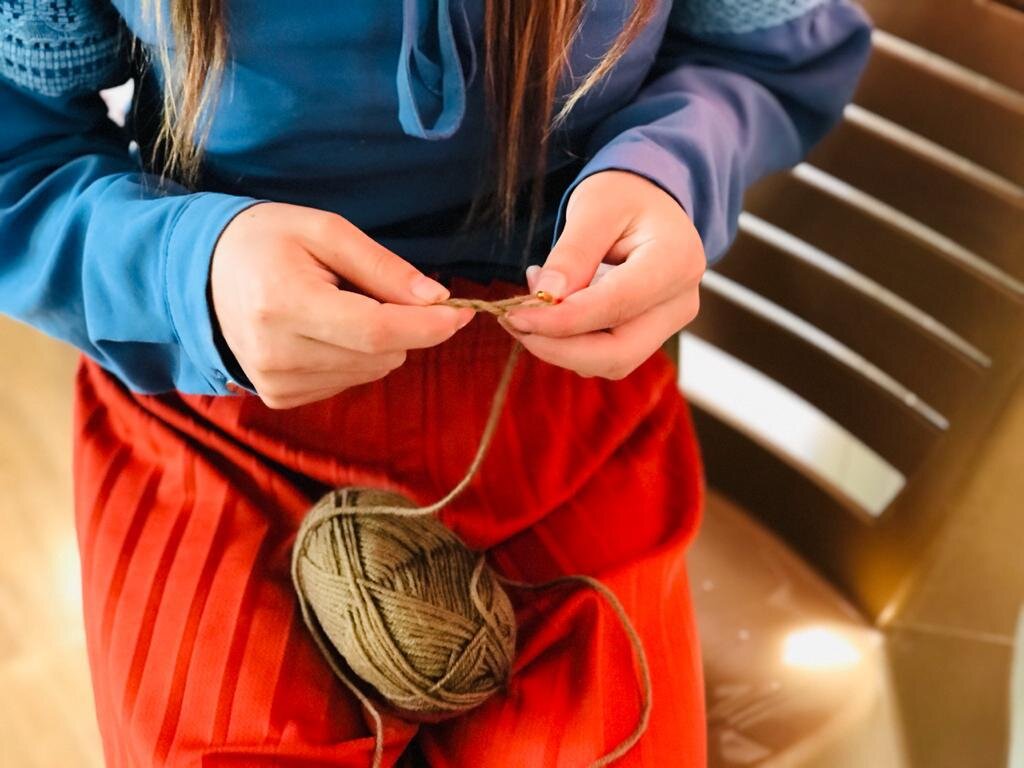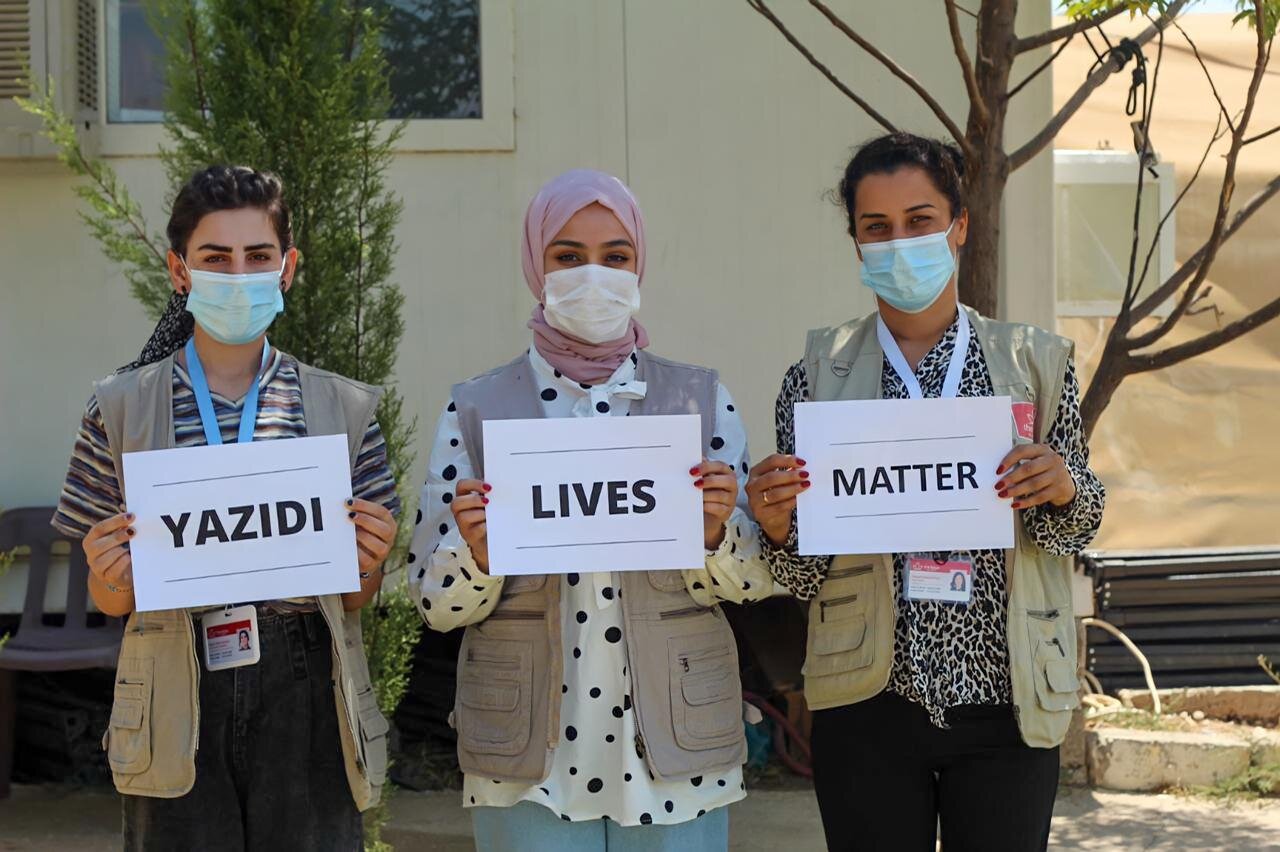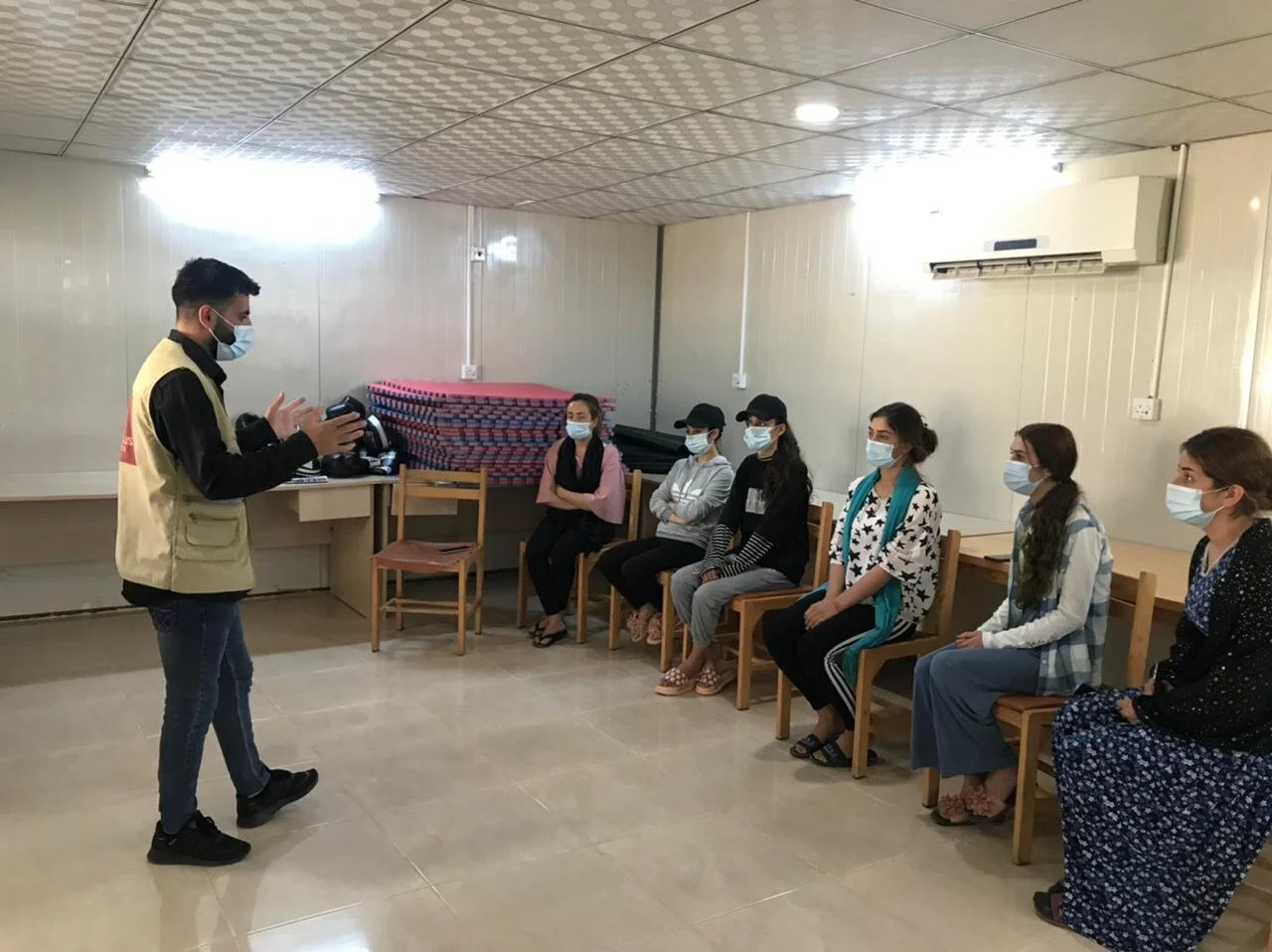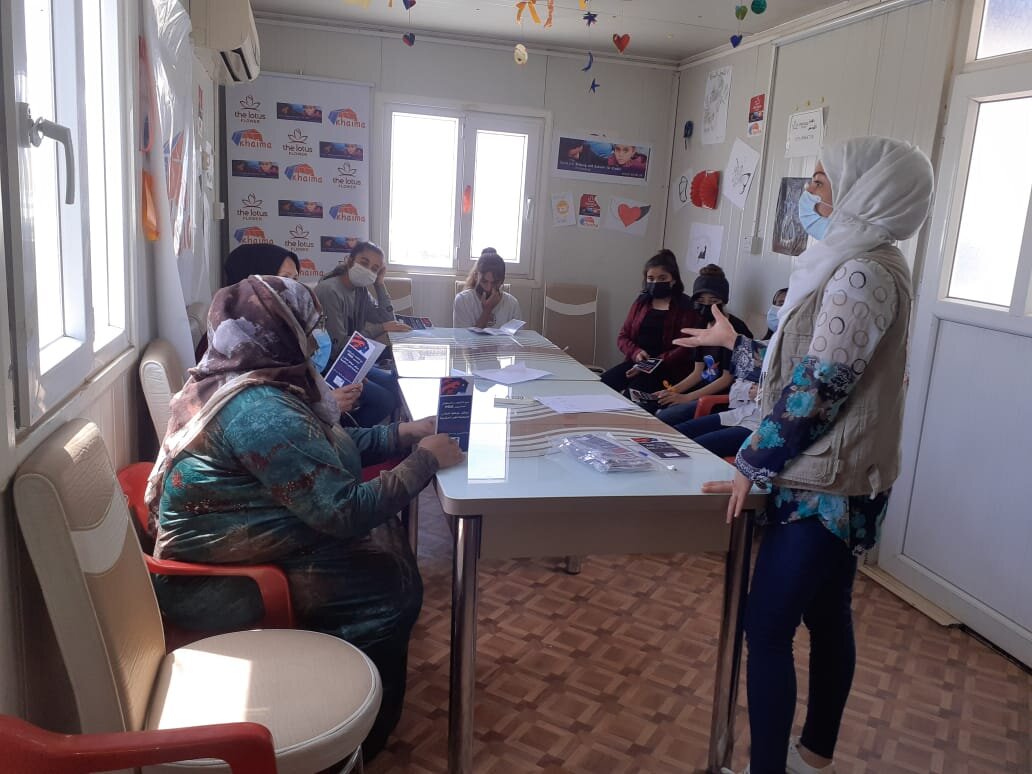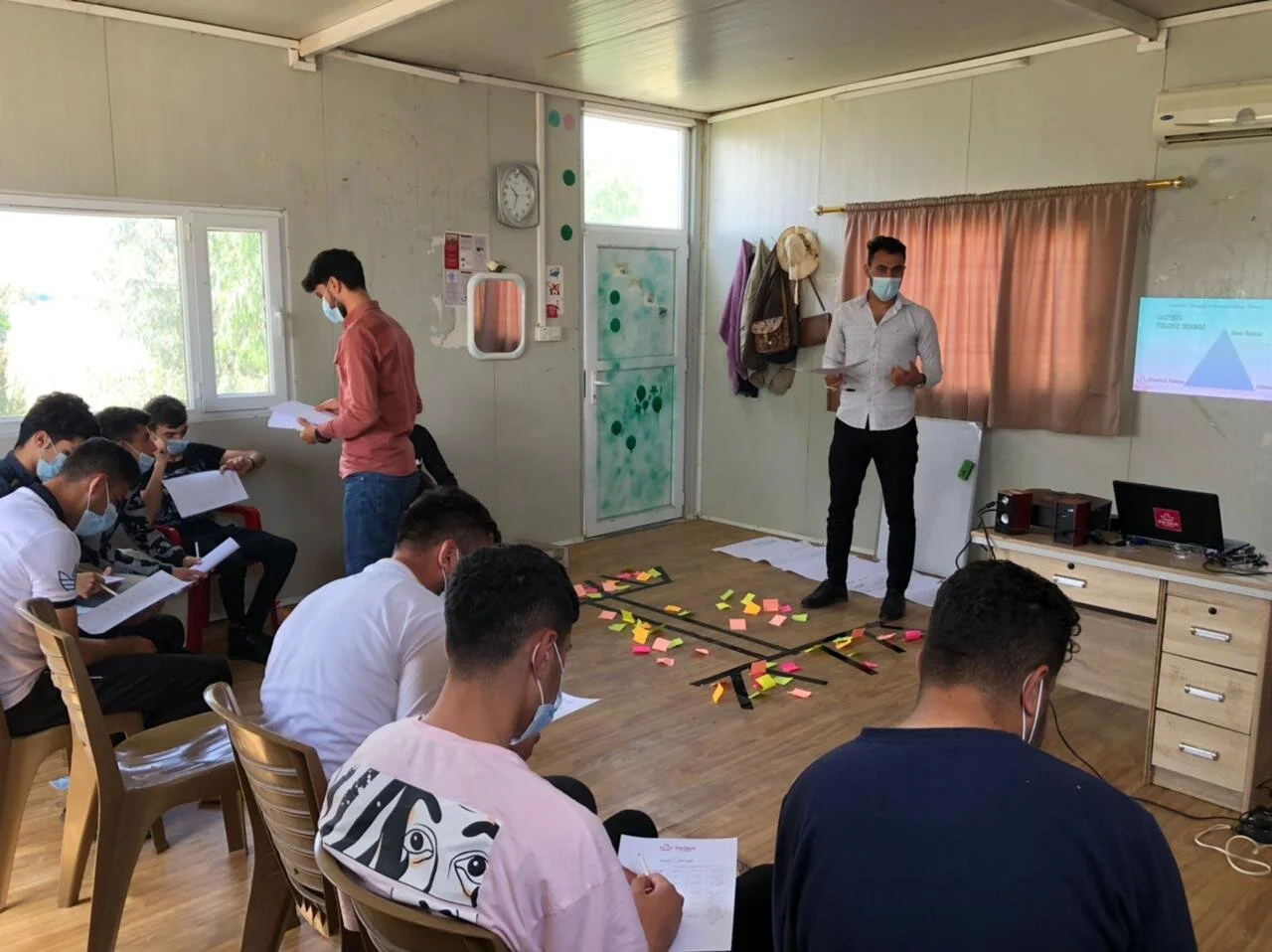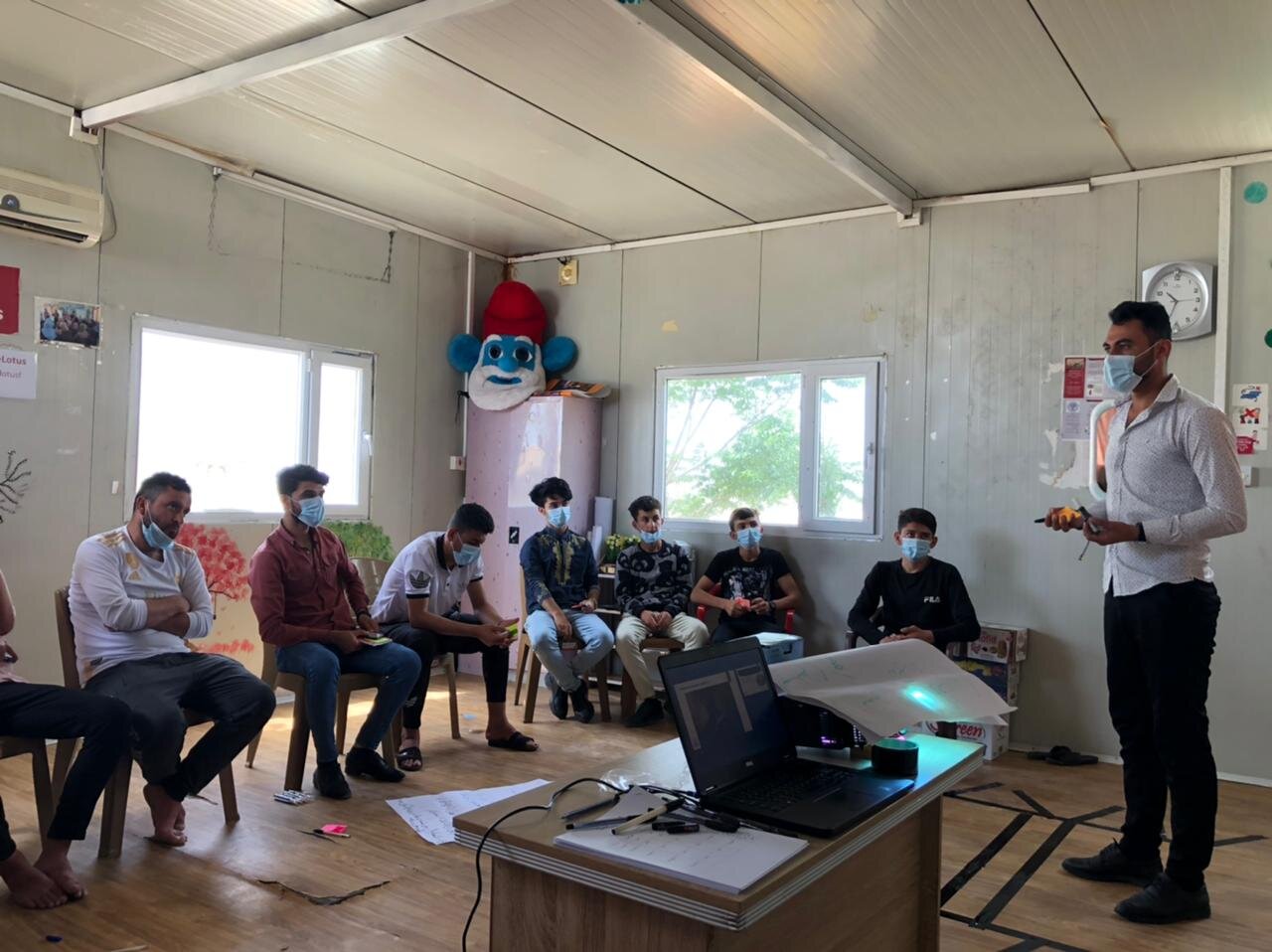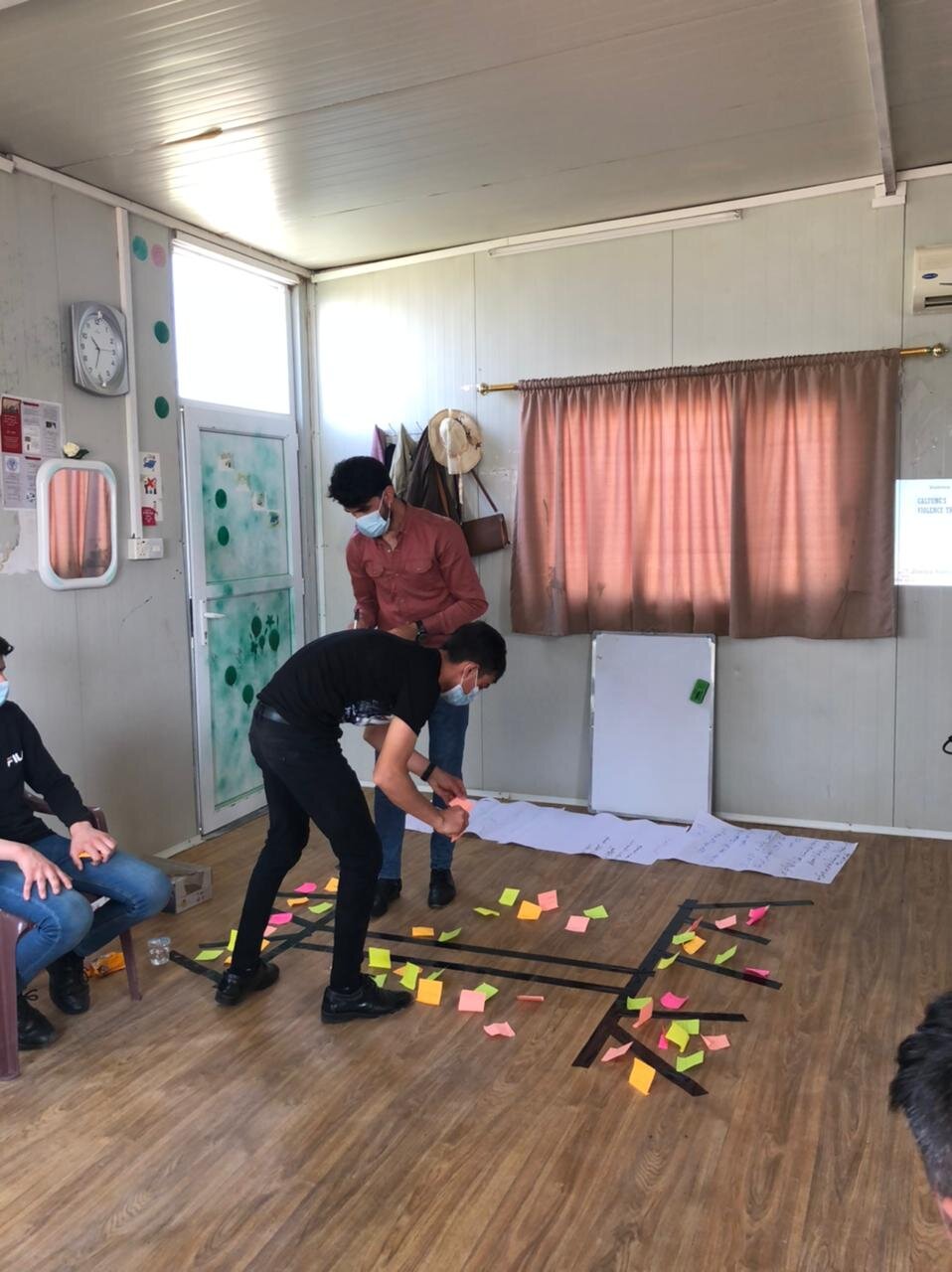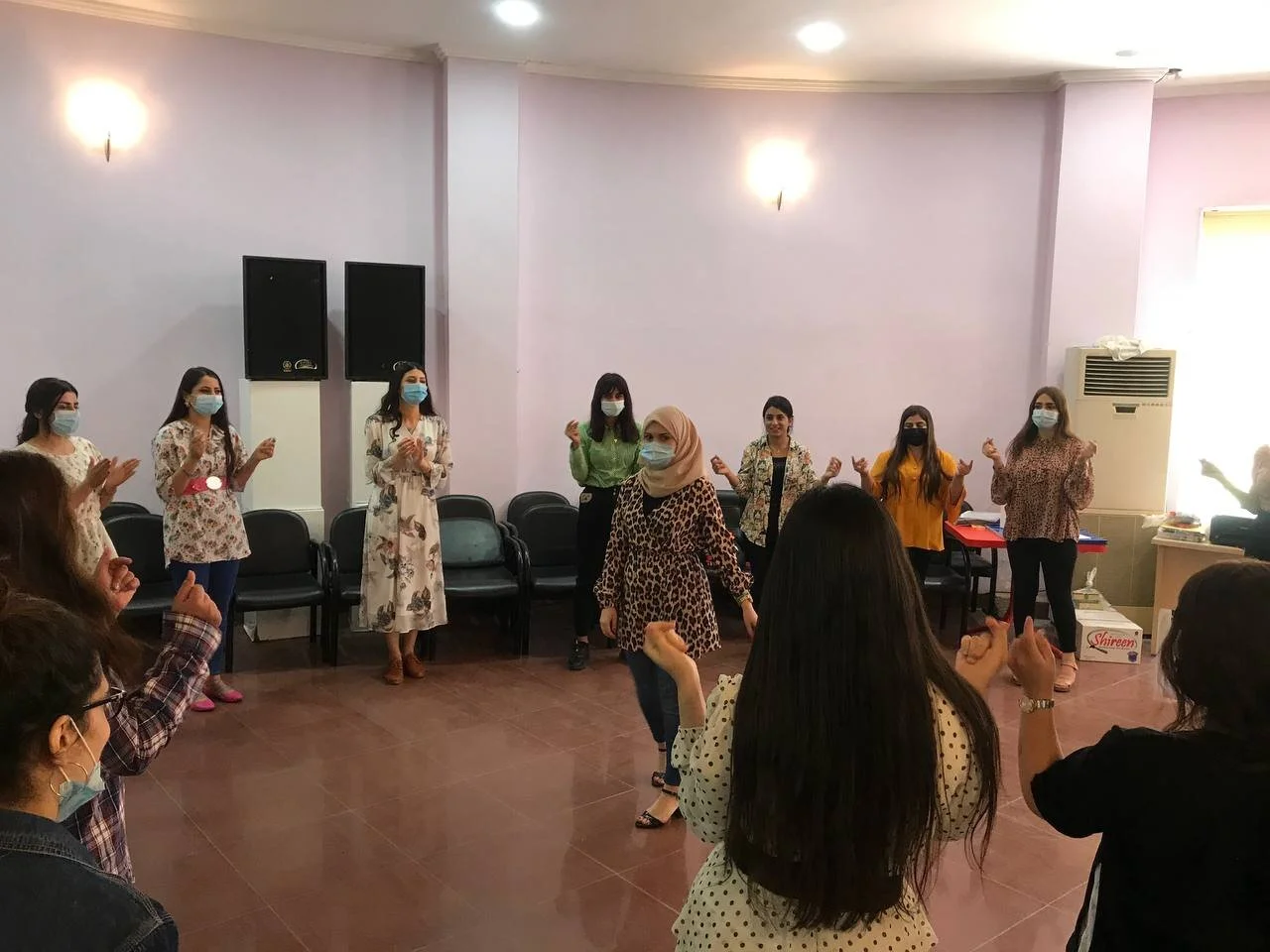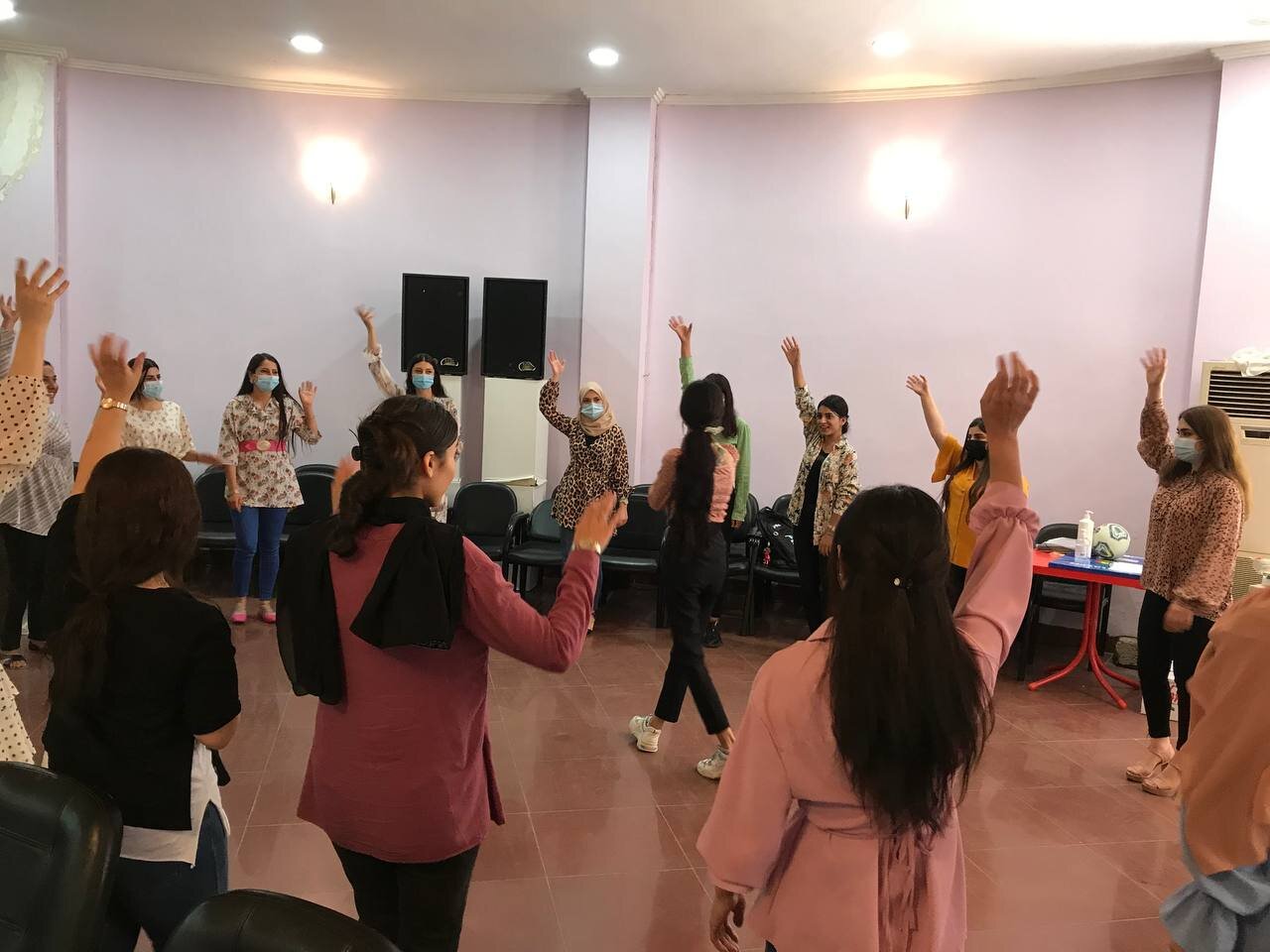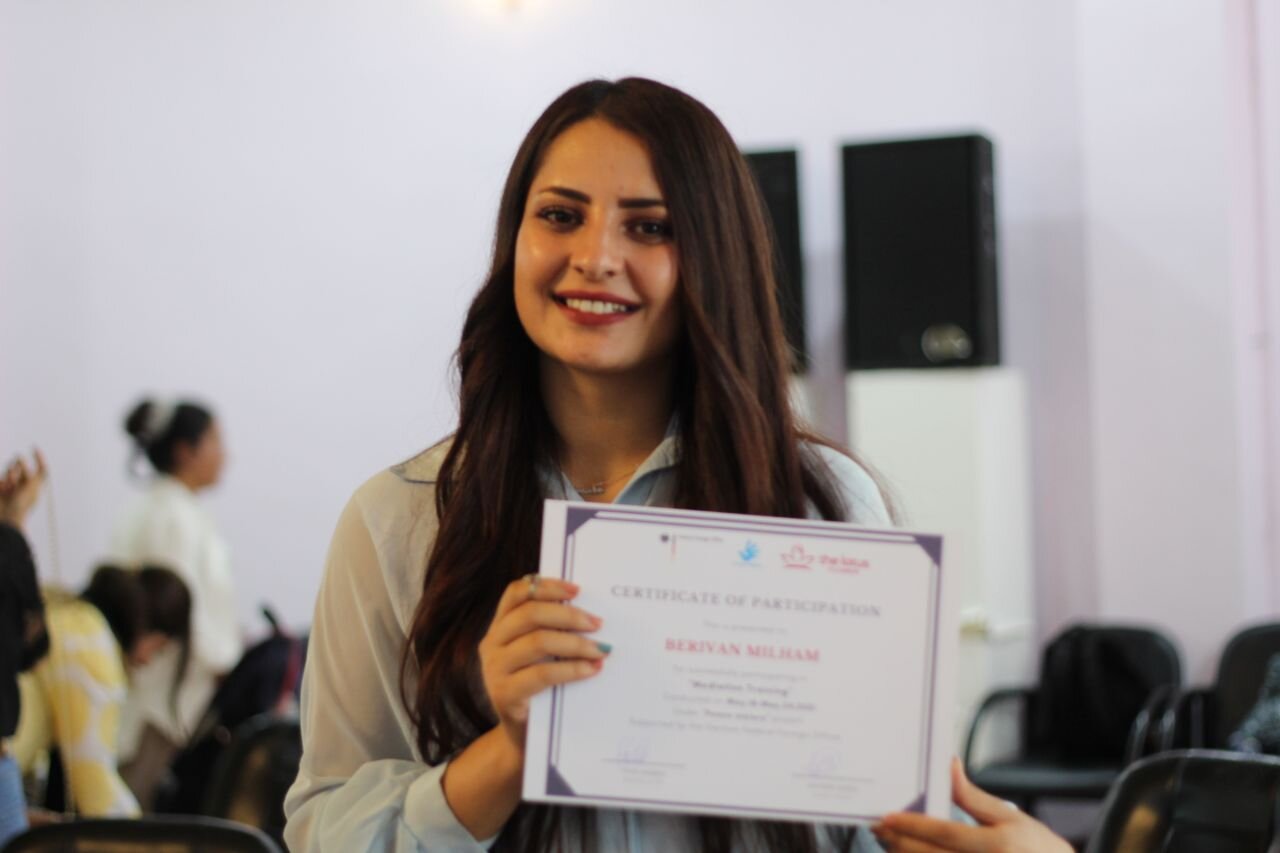One year on: Women's businesses grow after our project
One of our key partners and project donors, SEZ, paid us a visit this week to see firsthand the life-changing impact that our work together is making.
CEO Philip Keil and project funder Laurids Novak visited some of the women-run businesses which were set up almost a year ago following our collaborative livelihoods project. The initiative, held at Essyan camp in late 2020, included intensive training which resulted in seven brand new women’s businesses launching. It also provided much-needed support so that 15 other businesses could re-start after being badly impacted by Covid-19.
With the backing of SEZ and the state of Baden-Wurttemberg, new businesses which launched as a result of our project included food stores and clothing shops – including one set up by mother Mariam, pictured below. Selling clothes for women and children, she says: “Starting this business has helped me immensely, and now I’m able to provide an income to support my family. In the past three months, I have even expanded my shop and added in more space for clothing so I can meet the needs of my customers.”
As well as the women’s business support programme, we have worked closely with SEZ this year to implement a vital project on preventing sexual exploitation and abuse. This launched in April and reached over 800 beneficiaries in four months, through community awareness in camps for women, men and children. We also reached NGO and government staff in order to improve internal reporting and responses to sexual abuse and exploitation.
This project was especially important as incidents of abuse have risen sharply during the pandemic – due to factors such as lockdowns, isolation and economic crisis caused by widespread job losses.
During the visit with SEZ this week, we also discussed future joint projects – and of course, we’re greatly looking forward to changing more vulnerable women and girls’ lives in 2022…
Increasing suicide awareness this World Mental Health Day
With people uniting all over the globe to mark this year’s World Mental Health Day, we have been running our own campaign within IDP and refugee camps to promote the importance of psychological wellbeing.
As part of the initiative, which is in conjunction with our partners Zarok and Khaima, our team of trained psychologists have been offering information and awareness around a range of topics relating to mental health.
The campaign is taking place running at Rwanga, Domiz 2 and Essyan camps, and issues being covered include suicide – which has become an increasing concern within refugee and IDP communities in the past 18 months. Since the start of the pandemic, cases of suicide and those reporting suicidal tendencies have risen sharply, especially in young people who often feel they have nowhere to turn for support. With many stuck in their basic accommodation with little to do, feelings of isolation and despair have become all too common.
Using large boards that highlight specific issues, our psychologists are asking questions such as, ‘what causes someone to have suicidal thoughts?’ and distributing information and support – including numbers for vital hotlines – which anyone affected can access.
While mental health support is a huge priority of the Lotus Flower, there is huge inequality when it comes to service provision for refugee and IDP communities. Not only is support often limited and hard to access, but cultural and social challenges mean there are negative attitudes around mental illness, and the fear of stigma is recognised as one of the biggest barriers for treatment in the region.
During the early phase of the pandemic, we conducted our own needs assessment with more than 300 respondents. Within this, 86% of women we consulted had experienced increased mental health difficulties, due to loss of income, increased isolation and GBV. It was no surprise to us that 80% of respondents also said that access to a mental health therapist would be helpful. With many women and their families continuing to suffer a critical lack of food and medicine as well as increasing debts, our work in this area is more needed than ever…
How we’re working to end violence against women and girls
Our teams have been busy working on one of our most ambitious projects to date, aimed at preventing violence against women and girls.
The project has been made possible with the support of the UN Trust Fund to End Violence against Women, which is the only global grant-making mechanism exclusively dedicated to addressing all forms of violence against women and girls at local and national levels.
As part of our collaboration, we are working with IDPs and refugees in Zakho and Duhok communities, raising awareness of gender-based violence and supporting victims with mental health support and case management services.
Activities include positive masculinity workshops with men and boys, which are designed to help change traditional perceptions around women’s roles in society, and end harmful behaviours against them. These sessions are designed to celebrate the positive aspects of being male, and show that masculinity can be empowering rather than restrictive. During the workshops, participants work together to explore ways in which they can support women and girls, and cooperate to improve their lives.
With soaring mental health issues and rising cases of suicide amongst refugee and IDP communities since the outbreak of Covid-19, the project also includes mental health therapy for victims of gender-based violence (GBV). Other activities include GBV workshops, community awareness sessions and assessments of Covid-19 impact. Additionally, the project is providing support to women-led businesses that have been badly hit by the pandemic. Job losses have led to widespread economic hardship for women, resulting in even more demand for psychosocial and psychological support.
As you can imagine, we’re delighted to be working on this groundbreaking project with the UN Trust Fund, which to date has supported 572 organisations in 140 countries and territories. Its three priority areas focus on violence prevention, expanding access to survivors and strengthening the implementation of national laws.
We’ll keep you posted of our progress!
“They lost the thread of life” – Healing for men and boys
With mental health proving one of the biggest challenges of our times, we are pleased to have launched a brand new project which aims to help tackle men and boys’ hidden trauma.
In partnership with our friends at Khaima, the project is supporting 30 men and boys at Domiz 2 camp for Syrian refugees, through activities such as individual and group counselling, art therapy and English classes. The programme also incorporates physical recreational activities and community awareness, and is designed to encourage open dialogue and the sharing of past trauma to enable healing.
The three-month project began last week and will run until the end of 2021, and although most Lotus Flower projects focus on displaced women and girls in Kurdistan, we are very keen to support males too, as they have also suffered immensely during so many years of bloodshed and conflict.
Executive Director of Khaima Pfr. Andreas Goerlich says: “Some of these men and boys saw the atrocities committed by IS with their own eyes. Many had to endure being beaten or threatened. Others saw women being subjected to violence, and even men being beheaded. They hid what they went through in order to survive. But this affected their health because the anger, fear and trauma raged in them to this day. They then let out that anger on those they actually love – because they lost the thread of life.
“Now they are ready to be helped. This three-month project focuses on vital psychological health, and expressing their feelings with words. In art lessons, they can do this in a nonverbal way. They will learn about the power of their soul and how to deal with the past, with the help of a psychologist if necessary. We are happy to have joined up with the Lotus Flower and hope the project proves to be a good and healing experience.”
This project is all the more important, since Domiz 2 camp has until now had no services specifically supporting men and boys’ mental health and education. According to local authorities and community representatives who participated in consultation meetings in August, mental health disorders and suicidal tendencies have risen sharply during the pandemic – especially among youths who have little to do.
We hope this work - and future projects – can start to make a real difference to their lives…
International Day of Peace: Youths share powerful messages of integration
International Day of Peace is observed right across the globe every 21 September, and this year’s theme of sustainable, equitable recovery seems more fitting than ever.
With the fallout of the pandemic and the devastating situation in Afghanistan still fresh in everyone’s minds, the Lotus Flower and its partners, the German Consulate in Erbil, marked the occasion by holding special activities aimed at fostering greater inclusivity, tolerance and peace.
First of all, our team of Peace Sisters held a community integration session for a small group of children from Essyan camp which focused on the importance of coexistence and the vital role of young people in furthering peace processes.
The children were from both Muslim and Yazidi communities, and after two hours of discussion they wrote messages of peace to distribute with flowers at the camp, amongst youngsters with different religious beliefs to themselves.
Vian Ahmed, the Lotus Flower’s Regional Manager, said: “Previously, these children and youths have not the opportunity to express their feelings or their views and to share their good intentions towards each other. It represented a very positive step to mark International Day of Peace.
“While there is a lot of reconstruction being done in Sinjar and around, the relationships between these communities also need to be strengthened, so that people can once again coexist and live peacefully – as they did before the ISIS attacks of 2014. It’s so important that women and youths play a role as peacekeepers in their own community.”
During a second activity to be held later in the week, our Peace Sisters – currently taking part in a groundbreaking peacebuilding and mediation project in partnership with the German Consulate in Erbil – will visit important religious sites in Duhok and Lalish. They will attend sessions with religious leaders at mosques, churches and temples, in order to learn more about different religions and to help promote ideas around harmony and integration. Do check out our social media for further updates…
Sisters' Stories: Nawroz starts her own shop after our business training
Little gives us more joy than seeing the women we support thrive in new ventures that enable their economic independence.
A mother aged 46, Nawroz is Syrian refugee who took part in women-led business training provided by the Lotus Flower in Domiz 2 camp last September. Nawroz was so inspired by the training that she decided to set up her own shop, and now earns a modest income to support herself and her family.
Her shop sells clothing, accessories and beauty products, and is proving very popular with the local community. “The Lotus Flower training changed my perspective about business,” she says. “I had the simple idea of turning one of our rooms into a small store for women and kids, and it now helps me cover my family’s living expenses.”
Originally from Qamshli in Syria, Nawroz, has also participated in our awareness sessions and literacy classes, which helps her run her business more efficiently.
During the ISIS atrocities, she and her family found themselves fleeing their home, and her husband was arrested by the regime and imprisoned. After his release, they moved to Kurdistan, desperate to secure their safety and a brighter future and education for their children. “Our journey to Kurdistan was very difficult however, and we had pay more than $1,000 to a smuggler to get us across the border.”
It was upon arrival at the camp that she heard about the Lotus Flower’s women centres and our business training, which covered topics like marketing, accounting, profit and revenue, supply chains and sales.
While many of the women we support have ideas about viable businesses as well as certain skills, most lack the support to start them, making this kind of training a hugely important and empowering part of our work.
Since getting involved with our activities, Nawroz has not looked back - and we’re sure you’ll agree that she is a true inspiration!
Sisters' Stories: How Khalsa moved on from trauma
With the devastating plight of Afghanistan at the top of every news agenda, the story of 50-year-old Syrian refugee Khalsa shows why the world must not ignore the millions being displaced and left to fend for themselves.
As one of the women supported by the Lotus Flower and our partners Khaima and Zarok, Khalsa knows plenty about the turmoil being experienced by the Afghan people. She and her family were living in Douma in Syria until the end of 2012, when they were trapped by bombings and fierce clashes between regime forces and the free army. Blockaded for six months, life was dangerous and extremely hard. The family had little water, electricity and food, and the area around their home had been completely destroyed.
Even worse, Khalsa’s young son was then taken from her. “For six months we had no idea where he was,” she says. “We then discovered that the regime forces had kidnapped him to participate in the war.” In 2014, the family were blackmailed into paying smugglers 1m Syrian pounds – approximately £1,500 – for his release. The family then escaped to safety in Kurdistan, where they were housed within Domiz 2 camp.
Though relieved to be out of harm’s way, life was far from easy in the camp – especially as Khalsa’s son suffered from terrible nightmares and flashbacks about his ordeals. “It was so difficult to see him struggle and made me very sad,” she says.
However, Khalsa then took the opportunity to take part in a series of projects at our women’s centre in the camp – including English language and literacy classes. This means she can now read and write for the first time in her life. She also signed up for awareness sessions on a range of issues such as women’s rights and gender-based violence, and through our sewing and knitting classes, discovered a brand new passion.
“I love making woollen garments for my grandchildren. It really improves my mood and wellbeing.” Khalsa also took part in one of our first aid courses, which means she can help those around her in the camp. “I learned all about thermometry, and now give injections to people living nearby.”
Although it's hard to fathom what women like Khalsa have been through, her courage in overcoming such huge upheaval over the years is a true inspiration – and her journey sums up exactly what the Lotus Flower stands for…
Our new anti-abuse and exploitation project reaches 800 beneficiaries
We are delighted to report that our recent project to tackle Sexual Exploitation and Abuse (SEA) has been a resounding success, reaching over 800 beneficiaries in four months.
The project launched in April and concluded at the end of July, and was made possible with the generous support of SEZ and the Federal state of Baden-Wurttemberg. Our approach meant that as well as reaching women, men and child IDPs and refugees, we targeted NGO and government staff, in order to improve internal reporting and responses to sexual abuse and exploitation.
During the initiative, we held workshops and community outreach at Domiz 2, Essyan and Rwanga camps, and also targeted more than 100 government and NGO employees in Duhok city. Vital sessions on improving reporting methods for exploitation and abuse were implemented in cooperation with the Directorate of Combating Violence Against Women in Duhok.
As well as enabling attendees to better protect themselves from exploitation, the project was designed to ensure that perpetrators are more likely to be held accountable by responsible UN and Government bodies, plus other agencies in the region, through appropriate referral pathways.
The project was fundamentally important as incidents of sexual exploitation and abuse have risen sharply during the Covid-19 crisis – due to factors such as lockdowns, job losses and a shortage of resources. In our own needs assessment, we found that 76% of respondents had no idea what SEA was, while 63% said cases had increased during the pandemic.
Typically, SEA remains chronically under-reported due to fear of stigmatisation and rejection by the community, and there are few legal avenues to report and act upon abuse.
We look forward to seeing the benefits of everyone’s hard work in action – and to delivering many more valuable projects to help eradicate abuse and exploitation in future…
Check out the new Lotus Flower centre
This is our new Lotus Flower centre in Duhok City – and we’re pretty proud of the work that’s gone into creating such a calm and welcoming space for those we support.
In this centre, we will be reaching IDPs and refugees living outside of camps in host communities, where there are very few existing support services. In fact, according to UNOTCHA, it’s those in out-of-camp locations who are most vulnerable and who have the most difficulty in receiving any support. Frequently, these are the people who are totally left behind.
Our new centre will offer mental health and psychosocial support for women and girls, as well as employment training – including livelihoods skills and business grants. The centre will also provide support and awareness of gender-based violence, plus case management for survivors.
And we'll also be running our Positive Masculinity workshops for men and boys here, which help advance equality, change traditional perceptions about women and girls' roles in society, and reduce harmful behaviours against them.
We’re thrilled to have taken over this new space and that it’s going to make such a difference to so many more lives…
Sisters' Stories: The true mental health toll on women conflict survivors
Today we’d like to introduce you to Nazdar, a 22-year-old conflict survivor living in the Essyan camp in Kurdistan. So much of her life has been marked by war, loss and trauma, and inevitably, her experiences have severely impacted her mental health over the years.
Nazdar was just 15 when her Sinjar village was invaded by ISIS. Like so many others in the stricken region, she and her family were forced to flee their home, with no idea when they would ever be able to return.
With the conflict raging around them, the family hid in the mountains for a week, with no protection and barely any food or water. Nazdar herself suffered badly, struggling with prolonged menstrual bleeding as a result of extreme anxiety and fear.
As they tried to walk to safety in Kurdistan, Nazdar’s father became increasingly sick and could hardly walk, but eventually, they were picked up by a truck and reached the camp. Awaiting them was a very small tent – partly exposed to the open air – which was now home for the family of eight. “It was very harsh,” says Nazdar. “My father was chronically ill and paralysed, and I suffered with terrible migraines caused by stress. I didn’t know what to do.”
As she struggled to cope, Nazdar was put in touch with a Lotus Flower psychologist, and she began receiving regular counselling. Through this support, she began to understand her debilitating anxiety, what triggered these feelings and crucially, how best to deal with them. By working out a therapy plan that suited her, Nazdar has gradually built up her recovery and coping mechanisms. She also attends regular awareness sessions held by Lotus Flower staff, on issues such as gender-based violence, exploitation and human rights.
“I feel so much better these days, and that has enabled me to take part in other Lotus Flower activities too. I have been doing boxing, photography and craft and sewing courses, which keep me busy and take my mind off other things. It also means I have developed new skills and have been able to meet and bond with other women.
“As well as feeling better, I’m now able to support my father and family, which means I can finally feel more positive about our future.”
Sisters’ Stories: ‘Learning to read and write has made my life better’
Each week, the Lotus Flower runs popular adult literacy and language classes at our centres – and it’s always incredibly rewarding to see how these positively impact on the women and girls we support.
Nofa is one woman who says she has benefitted enormously from learning to read and write for the first time in her life. Now aged 34, Nofa first came to the Essyan camp after fleeing her Sinjar home in August 2014. Following the ISIS invasion, she and her family spent eight days in the mountains with no food or shelter. “It was very hard,” she says. “We walked on foot and only had water to keep us alive. It was a terrifying situation, and everyone was scared and crying as the sound of bullets echoed around us.”
Life in the camp has not been easy since; Nofa, her husband and five children all share a small, cramped tent, and they have few possessions or comforts. “It’s boiling hot in summer, with temperatures regularly climbing over 100 degrees, and freezing cold in winter. Living in a tent can be dangerous too, as there are often electrical surges or heavy thunderstorms.”
Unsurprisingly, such a harsh environment began affecting Nofa’s mental health. “With my children at school and my husband working most days, I was often alone at home with nothing to do.”
Despite being illiterate, Nofa was determined to learn new skills for herself, and she began attending the Lotus Flower’s literacy classes two years ago. Having made huge progress since then, she says: “I love it. It takes me a long time to get to the centre from our tent – especially in hot weather or in the snow, but it’s always worth it. Now I can read and write – whereas before I could not even read my doctor’s name on the board.
“I’m determined to keep learning. After all the effort I’ve made, everything has changed for me, and my life is so much better. I’m able to teach my children and help them with their schoolwork, and my new skills mean I can also help my husband. I will hopefully soon be able to get a job myself, which will help me earn an income to support my family for the future.”
Nofa’s story shows exactly why we are so committed to running these classes – and all the other kinds of education and skills training that we provide. Please do support us if you can, so we can reach hundreds more women and girls just like her…
Why the world must remember the forgotten Yazidis
This week, the Yazidi community will once again remember all those who died and went missing during the devastating ISIS attacks of 2014.
On August 3rd of that year, Da’esh militants stormed the Iraqi districts of Sinjar, unleashing some of the worst crimes ever witnessed by our generation. They murdered men and the elderly, kidnapped women and girls and subjected them to rape and enslavement, and recruited boys as young as seven into their deadly clutches.
Today, thousands of innocent people remain missing, and mass graves are still being discovered. Of those who fled to safety, hundreds of thousands still live in primitive camps for internally displaced people and refugees, and most are unable to return home – largely because their houses, farms and businesses were destroyed.
While there has been global recognition that these attacks were genocide, justice has in no way been served, and there is no accountability for the heartbreaking loss of life and human rights abuses that occurred seven years ago. Not only that, but Yazidis also live in fear of an ISIS resurgence, which could bring yet more violence, destruction and needless bloodshed. Basic services and resources also remain in desperately short supply, and Covid-19 has of course made matters worse, with those who were already living in poverty pushed even further to the fringes of survival.
It’s no wonder that this age-old ethnic minority feel as if they have been forgotten by the world – and that their lives hardly matter. At the Lotus Flower, we work hard every day to show that Yazidi lives do matter – as do the lives of all refugees and displaced people.
The programs we provide at our centres are designed to enable survivors to build brighter futures for themselves, through education, livelihoods projects and awareness of issues such as gender equality, human rights and mental health.
But we can’t do it alone. So much more is needed from the international community, both in terms of day-to-day support and in seeking some level of justice for victims.
As you can see from these photos, our staff are proud to stand with the Yazidis, today and every day.
We have not forgotten, and we never will.
How our mental health support is changing lives in the pandemic
The Covid-19 crisis has had a huge impact on the women and girls we support - not only causing a sharp spike in violence due to lockdowns, gender-based violence and economic hardship, but also a massive rise in mental health problems.
In fact, in a Covid-19 Needs and Assessment report we conducted in May 2020 with more than 300 people, 86% of female respondents said they had experienced increased mental health difficulties during the pandemic. It therefore came as no surprise to us when 80% of these women said access to a professional counsellor would be helpful to their overall wellbeing.
As a result, mental health support has become one of our biggest priorities at the Lotus Flower, and our trained psychologists have been working hard to provide therapy in a safe environment since the pandemic began nearly 18 months ago.
Delivered in Covid-safe sessions one-to-one, within groups, or even on the phone, the aim of the therapy is always to make women and girls feel secure, valued and able to trust our staff 100%. Those who have received this support in recent months tell us it has been incredibly beneficial to their wellbeing.
For instance, there’s 18-year-old Nazdar, who lives with her family in the Essyan camp. Ill-health means she and her loved ones are unable to work, and when Covid-19 broke out, she was struck by intense anxiety and psychological stress. “Covid-19 impacted us a lot,” Nazdar says. “Trying to survive in camp and seeing death in front of our eyes became all I could think about. As I can’t take care of my parents, I felt very guilty.”
Nazdar was put in touch with the Lotus Flower through a community mobiliser, and began counselling sessions with a psychologist. “I never thought that speaking to someone would help, but it has really made me feel better. I also like visiting the centre to meet other women and girls, as talking to them helps too.”
Another who has benefitted from this support is 16-year-old Shaliza at Rwanga camp. Her mental health issues developed after the ISIS attacks of 2014, when she was still a young girl. She lost many friends and relatives during the conflict, and says: “I was always angry and unhappy after that. The situation impacted on me at school too and I was never able to speak in class or answer any of the teacher’s questions, so I stopped going.”
After coming to one of the Lotus Flower centres, she began receiving counselling, and within two months saw huge improvements in her mental health. “It has helped me overcome my psychological problems, and I feel much better now. The way I treat my siblings has positively improved too.”
There are hundreds more women and girls like Nazdar and Shaliza who have received therapy from the Lotus Flower – but the true scale of need for mental health support means we simply cannot meet demand as it stands. If you can do anything to help us, please get in touch, or donate on the button below. This work is so very important, and it genuinely has the power to change lives…
Diary of a week at our women’s centres
Most people probably have no idea about the incredible hard work that Lotus Flower staff do behind the scenes – but it’s fair to say that our women’s centres are a hub of activity all through the week!
As well as our major projects which are often on the go, our three centres at Rwanga, Domiz 2 and Essyan camps are also home to a weekly schedule of activities and classes which are fundamental to the mental and physical wellbeing of the women and girls we support.
For instance, on any given day, there may be gym or boxing classes for girls, keep-fit sessions for women, plus first aid and classes on staying safe from Covid-19. There are also plenty of educational classes during the week – ranging from adult literacy and English to sessions in Arabic, as well as photography training and staying safe online.
Awareness groups also take place at each of the three centres every week, on topics such as menstrual health, gender-based violence and the prevention of sexual exploitation and abuse.
Having plenty to do to get the women and girls out of their accommodation and mixing with others is so important – not only for their mental health, but also for their physical wellbeing and educational development. Our Regional Project Manager Vian says: “Having regular activities and classes is vital – not only so women and girls have something to look forward to, but also so they can develop a sense of routine and purpose. Bringing them together in social settings also helps them to heal from their past traumas.”
One regular participant in our sports classes is Khokhe, a 32-year-old ISIS survivor from Sinjar. She is also suffering with cancer, and says frequent exercise provides a welcome boost to her health. “I can’t describe how much activities like boxing have helped me feel better,” she says. “It helps me recover and stay strong for my children and family. I attend on a daily basis and can’t wait for what’s coming next. The trainers are great – and very intelligent, too.”
The table below shows you a typical calendar of activities – so as you can see, our wonderful team of staff are keeping very busy!
Sisters' Stories: A day in the life of a Yezidi survivor
Life is always hard as an IDP, but with our support things often become a little bit more manageable - and a whole lot more hopeful.
Take the story of Nine, who is a 36-year-old mother, a small business owner and a Yezidi refugee living in the Essyan camp. Like so many other women IDPs in this area, she has experienced major upheaval and trauma in recent years, but is now able to provide for her family.
As you’ll see below in the beautiful illustrations created by our friends and partners at Choose Love, Nine’s daily life is pretty demanding from the moment she wakes until she goes to sleep at night. As a mother of six children, her husband is disabled, so she is solely responsible for feeding, clothing and caring for her whole family. It takes immense resilience, effort and courage.
Nine’s day begins with cleaning the house and making breakfast for her children, and she then heads to open up the little shop that she opened with the Lotus Flower’s support. This brings in a modest wage so that she can afford to take care of her family. While juggling work with her role at home means she barely has time to pause for breath, Nine is happy to have the chance to earn a living at long last.
Thank you to Choose Love for bringing her inspiring story to life in such a stunning way…

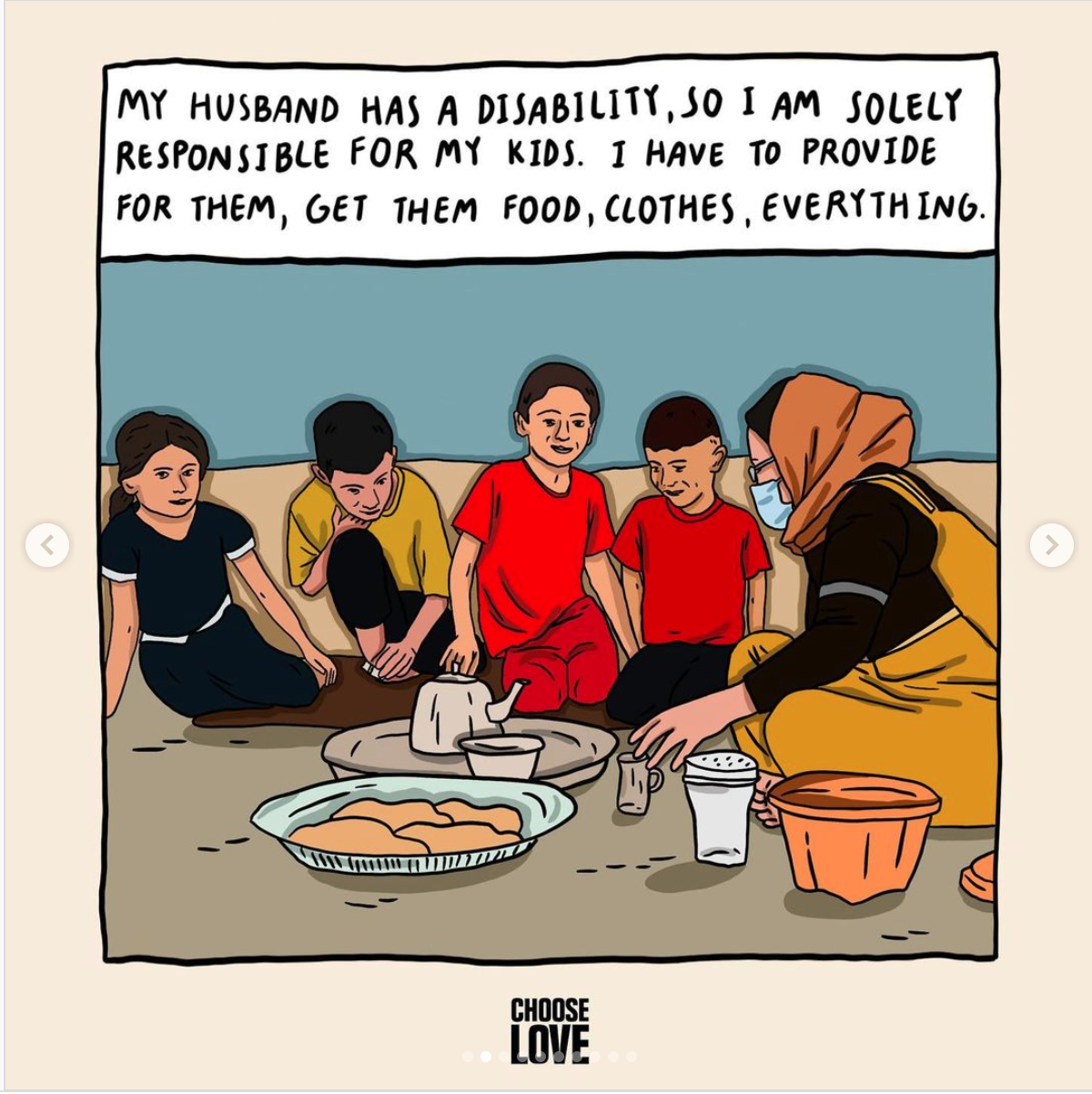



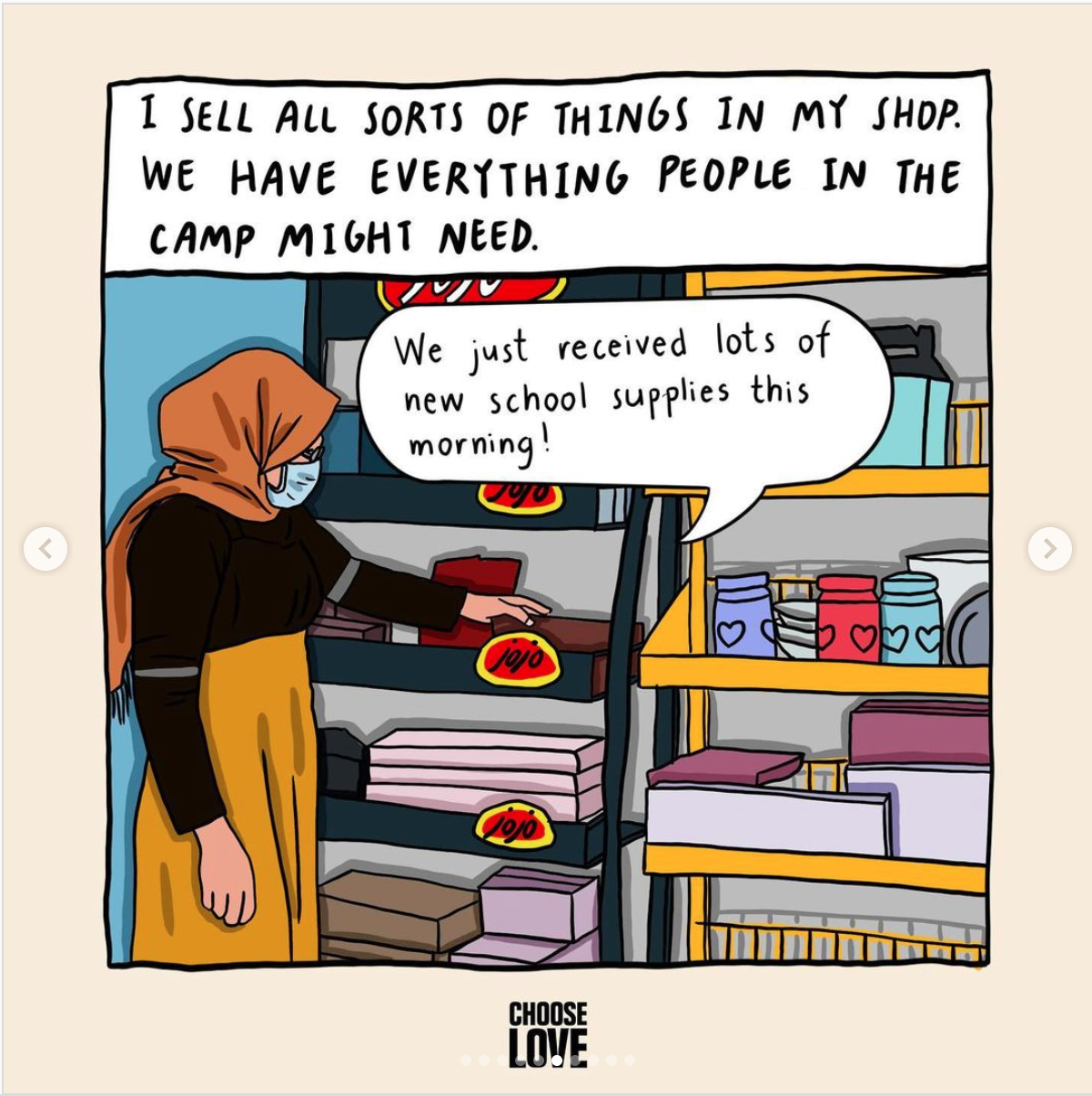
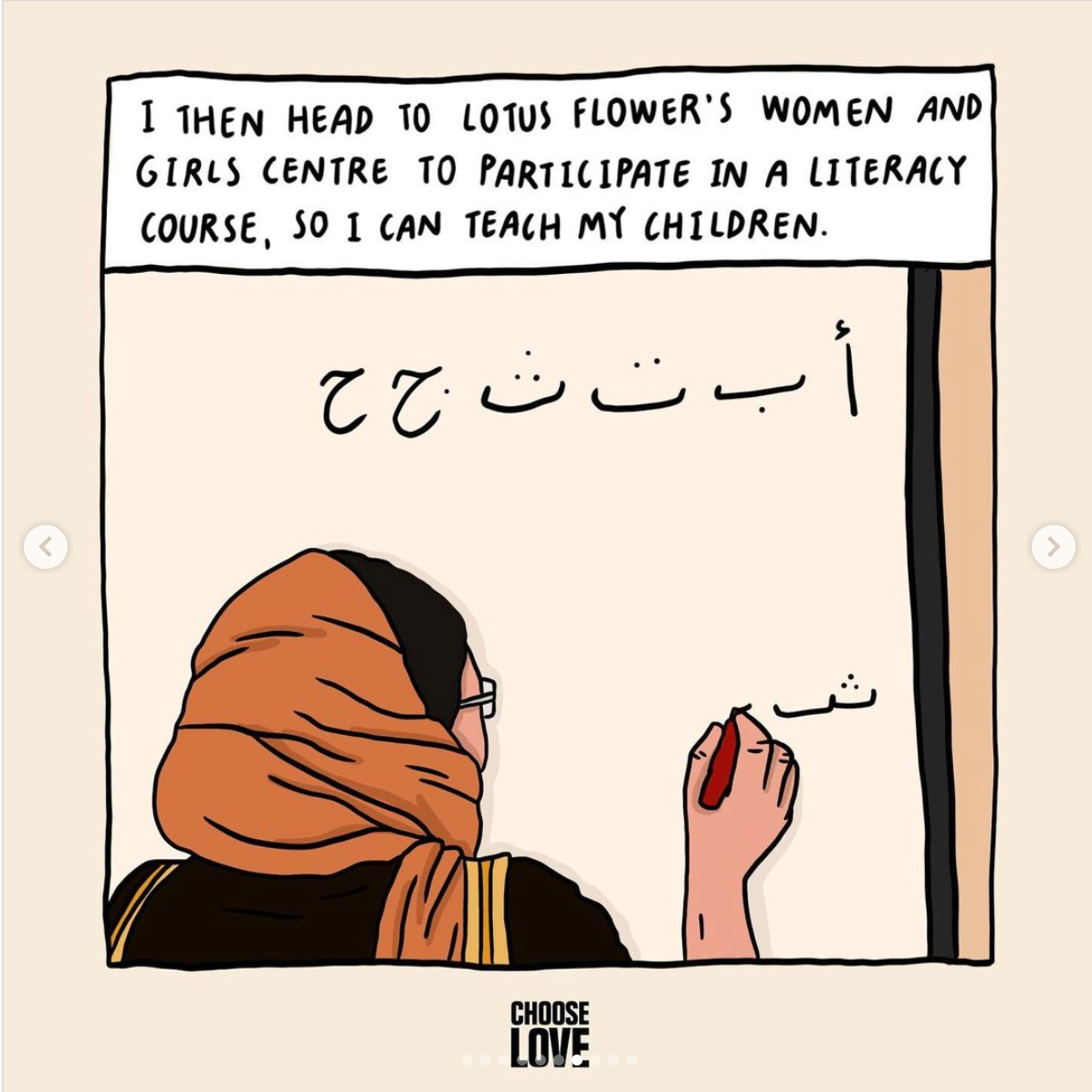



Our founder joins panel on supporting refugees and IDPs in the pandemic
Our founder Taban Shoresh is delighted to be taking part in a special panel to discuss the global response to the refugee crisis during the pandemic.
The panel – called Making Crisis Response Agile and Adaptive – takes place on Monday 21st June at 1pm (UK time), and what’s more, any of our supporters can register to attend virtually too. Taban will be joined on the panel by Arwa Damon, founder of INARA, and Anne Sweeney, the co-founder of RefuSHE, with the session hosted by Bisan Salameh from the UNHCR.
It promises to be a fascinating talk, looking at ways that organisations like the Lotus Flower have continued to serve displaced populations during the pandemic.
In collaboration with The Big Heart Foundation UAE and the UNHCR, the panel forms part of the Sharjah International Award (SIA) for Refugee Advocacy and Support, which is recognising organisations for their efforts and achievements in delivering impactful services to refugees and IDPs during a time of such uncertainty and disruption.
Topics to be discussed include:
o The multi-faceted journey and life of being a refugee across the Middle East & Africa,
o The on-ground adverse effects the COVID-19 pandemic has posed to refugees and other displaced populations,
o Innovative practices that refugee-focused organisations have undertaken to overcome challenges caused by the pandemic.
We’re very proud to be involved – and if you’d like to attend, you can register here: https://tinyurl.com/fznfbrjw
Our second PSEA project gets underway
The Lotus Flower recently launched a second major awareness scheme to help prevent sexual abuse and exploitation within the camps and communities where we work.
Targeting multiple groups and genders, our four-month PSEA (Prevention of Sexual Exploitation and Abuse) project is underway at our three centres at Domiz 2, Essyan and Rwanga camps, and aims to dramatically raise awareness of abuse of women and girls, as well as improve inferior reporting mechanisms.
As part of the initiative, we are also conducting PSEA workshops for government institution employees in Duhok, in cooperation with the Directorate of Combating Violence Against Women. The project is kindly being funded by SEZ and the Federal State of Baden-Württemberg in southwest Germany.
The project follows our initial PSEA project, which ran as a pilot from October-December 2020. It began with an assessment of SEA awareness and support, which found that 76% of respondents had no idea what SEA was. In addition, 63% said they believed cases of SEA had increased during the pandemic.
Crucially, as well as targeting women and girls, the project engages men and boys in the process, in order to change traditional social norms that contribute to SEA. We aim to reach up to 800 individuals through community outreach and weekly workshops – including for around 100 government employees.
Unfortunately, cases of sexual exploitation and abuse have risen sharply during the Covid-19 crisis – partly due to isolation, job losses and a critical shortage of resources. But in spite of the increase in cases, SEA remains desperately under-reported due to fear of stigmatisation and rejection by family and the wider community. There is also a lack of legal support to enable recriminations.
Hopefully, this project will really make a difference in protecting many more vulnerable women and girls.
Changing attitudes with our 'Positive Masculinity' workshops
Although the Lotus Flower primarily supports women and girls, we fundamentally believe that men and boys have a crucial role to play in advancing gender equality and bringing real change for everyone.
For that reason, our trained psychologist Alind has been busy conducting ‘Positive Masculinity’ workshops with male IDPs and refugees, which are aimed at raising awareness and shifting traditional perceptions around women’s roles in society, helping end harmful behaviours against them.
The sessions are designed to celebrate the positive aspects of being male, and show that masculinity can be empowering rather than restrictive or abusive. The participants work together to learn how they can support women and girls, and cooperate much more fully to improve their own lives, as well as those of their families.
The workshops are taking place at all three Lotus Flower centres until the end of the year, and are especially focused on eliminating gender-based violence, which is sadly still all too common within family settings. Other topics explored include ideas around masculinity itself, and what it means to be a modern-day man.
So far, the sessions have received a hugely positive response from the men and boys taking part, and there have been many productive and fruitful discussions. Fuad, a 24-year-old Yazidi IDP says the workshops have helped him re-evaluate his own domestic responsibilities. “Now I help my family with things like cooking and cleaning,” he says. “And I feel better when I talk to them about my problems.”
Decades of war and conflict in Iraq have only served to cement tropes of oppression and violence against women and girls, and the ISIS atrocities of 2014 made things much worse. In addition, boys have tended to grow up believing that a women’s role is based purely around subservience and domesticity, meaning females are frequently excluded from educational and employment opportunities, as well as all areas of public life.
It is our hope that our work on Positive Masculinity will go a long way to helping change things for the better…
Meet the first of our new Peace Sisters
The Lotus Flower’s latest project is going from strength to strength – with our first group of women and girls becoming fully-fledged Peace Sisters.
In partnership with the German Consulate in Erbil, 25 women and girls received training by our five qualified volunteers in Duhok city.
One of the training sessions in Duhok
The training included learnings around peacebuilding, mediation and conflict resolution, and also featured a session on the UN’s Resolution 1325 – which promotes the participation of women and incorporation of gender perspectives in all UN peace and security efforts. It also calls on all parties in conflict to take measures to protect women and girls from gender-based violence and sexual abuse.
Iman is looking forward to putting her skills to good use
One of our proud new Peace Sisters is 20-year-old Iman, a Yazidi IDP, who says: “The Lotus Flower training was a great opportunity, and I’m very happy to be called a Peace Sister now. When we first ran from Sinjar and were displaced in Sulimaniyah, we encountered conflict with other communities – especially at school. I always tried to play the role of mediator in such situations, but this training has made me more skillful and taught me professional lessons to further understand mediation, its theories, practices and most importantly, the essential role that women and girls can play.”
Zaynub is also delighted to be a Peace Sister
Another of the Peace Sisters is Zaynub, 22, from Duhok. After the training she said: “It has given me a very good insight into mediation and I now know how to apply it in my daily life. Being skilled in mediation between two conflicting parties is something I didn’t have before, and I believe it will be a huge benefit in my life.”
The training also included an appearance from Kathrin Jaschke, who works for the German Consulate in Erbil and is responsible for politics, humanitarian affairs and human rights. She told the participants: “Germany and the Consulate General are very happy and proud to support the Peace Sisters project. The main goals of the project are that you as Peace Sisters will become key drivers of peace building negotiations, rebuild your communities and lead mediation within the community. You will take on leadership roles and practice critical thinking, teamwork, communications and public speaking.”
Kathrin Jaschke from the German Consulate in Erbil showed her support for the new Sisters
She added: “IDP and refugee camps are not a long-term solution to the humanitarian crisis caused by violent conflict. Therefore, it is necessary to begin the conflict resolution and reconciliation process between ethnic and religious groups. The Lotus Flower’s project and you as Peace Sisters play a very important role in this work, so that people can trust their neighbours again.”
Certificates were received by the women
Honouring the new Peace Sisters
More than 50 women and girls in the region will take part in the project, empowering them to recognise their human rights and be more involved with leadership roles in the future.
We're hiring: Case workers (x3)
Position title: Case Worker
Number of positions: Three
Duration: One year with possible extension
Location: Duhok, Zakho, Domiz 2 camp
Deadline for submission: 10th June 2021
Duties and responsibilities:
- Assessing cases and compiling case reports containing relevant information
- Ensuring that case reports are kept up to date
- Providing support, guidance, and counsel to families in need
- Making referrals or introductions to other agencies
- Scheduling and escorting individuals to appointments with legal aid workers, psychologists etc
- Monitoring visits between at-risk or fragile women and girls and family members
- Facilitate, collect and report information regarding the overall situation of women and girls’ risks, with particular attention on those who are vulnerable/at-risk
- Submit weekly reports concerning implemented outreach activities, recorded cases and participate in weekly meetings supervised by the GBV Coordinator
- Maintain files, registers, computer databases and records in paper or electronic format based on principle of confidentiality
- Keep records of field expenditures where appropriate and report on these to the GBV Coordinator
- Provide and undertake training under project activities for community-based staff, local actors and Lotus Flower actors
- Develop ideas and participate in undertaking different women and girl’s protection campaigns in the area of implementation
- Implement other Lotus Flower activities as required.
Qualifications and preferred skills:
- University degree in social work and at least one-year’s relevant work experience
- Strong written and spoken skills in Kurdish, Arabic and English
- Proven technical skills in the field of women and girls’ empowerment
- Good computer skills (MS Office, including Outlook).
- Strong experience in case management, GBV interventions and provision of training, including resilience and positive discipline programs
- Strong organisational skills
- Proven skills including planning and budget tracking capacities
How to apply:
Please send your CV and cover letter to careers@thelotusflower.org, stating “Case worker vacant position” in the subject line of your email.














